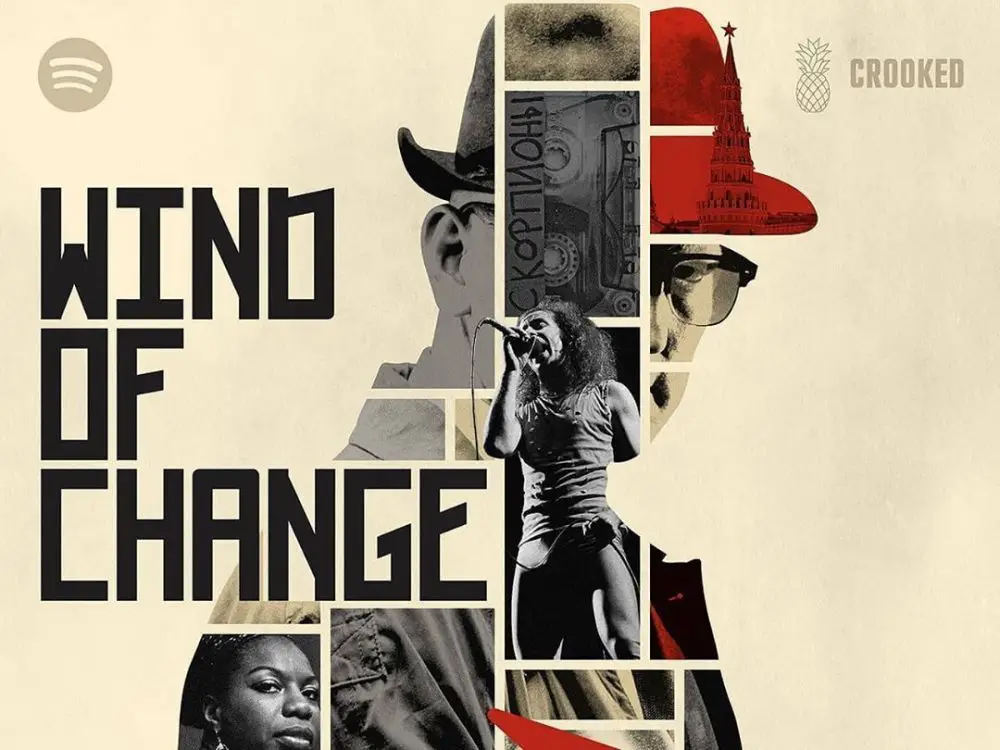Everyone loves a good conspiracy theory. I myself am guilty of spending far too much time scavenging through the rabbit holes of the internet when a fascinating conspiracy theory catches my eye. So when I heard about the “Wind of Change” podcast, which explores a rumor that the CIA wrote a rock song to help end the Cold War, I naturally had to check it out.
While plenty of people can relate to my interest in conspiracy theories, the topic generally gets a bad rap. Critics of conspiracy theories see them as dangerous tools for unjustly defaming people and promoting harmful narratives that are not based in truth.
Plenty of conspiracy theories certainly do more harm than good. However, “Wind of Change” proves that not all conspiracy theories should be written off as destructive nonsense. The podcast demonstrates how researching certain conspiracy theories can actually be a productive way of understanding the more mysterious ways the world functions behind closed doors.
Throughout the podcast’s eight episodes, journalist Patrick Radden Keefe searches far and wide to discover if there is any truth to the rumor that the CIA had a hand in writing the song “Wind of Change.” The West German rock band the Scorpions released the song in 1991, just as the Soviet Union was collapsing. Keefe learned of a story supposedly told by a member of the CIA that the agency wrote the song as part of a psychological operations mission aimed to help galvanize the people of the USSR toward the end of the Cold War.
“Wind of Change” is investigative journalism at its finest. Keefe isn’t just some guy sitting in his basement with nothing better to do than dig into rumors involving CIA spies, Soviets and rock music. Rather, the host uses his professional journalism skills to provide an intelligent and timely look into how government influence seeps into art and culture.
Here are the reasons that “Wind of Change” is so much more than an entertaining podcast about a conspiracy theory.
Keefe Did His Research for “Wind of Change”
Seriously, he really did his research. Keefe spent almost a decade exploring any and every angle that could potentially lead him to a definitive answer regarding the rumor’s validity. On the show, he interviews everyone from former CIA agents to a GI Joe collector who once told a similar story on the internet about the CIA influencing the Scorpions’ music. He even manages to speak at length to Klaus Meine, the Scorpions frontman and supposed composer and lyricist of “Wind of Change.”
Keefe not only talks to the right people, but he also travels to the right places in search of answers. He goes to countries such as Russia and Germany, inserting himself directly into locations that play an important role in the theory’s narrative. His research extends beyond the limits of the internet, allowing him to discover things he never would have found just sitting behind a computer at home.
History Plays an Important Role
“Wind of Change” is just as much a history lesson as it is a podcast about a conspiracy theory. Keefe provides detailed explanations about Cold War politics and the underground USSR rock scene to ensure that listeners can follow the story. I knew very little about the Cold War and the Soviet Union before listening to this podcast, but Keefe’s accessible explanations and background made it so I never felt confused.
More importantly, the history that Keefe provides creates credibility. His research establishes that the CIA has taken part in similar missions involving art and culture in the past. For example, the CIA sent singer Nina Simone to perform in Nigeria in 1961. However, Simone had no idea the CIA was using her as part of a mission. She believed she was being sent by an organization called “The American Society of African Culture,” which just turned out to be a front for the CIA.
Additionally, the CIA actively supported the creation of the 2012 movie “Argo,” whose story painted the organization in a very positive light. The CIA even granted the movie permission to film inside its headquarters.
There is thus substantial evidence that the CIA has connections to art and culture. With this, it is much less likely that the theory involving the Scorpions and the CIA is simply the brain child of someone’s wildly active imagination but rather a story that could very well be true.
It Provides A Timely Message About American Government Secrecy
Currently, Americans’ overall distrust of government is quite high. According to The Pew Research Center, only 17% of Americans trust the federal government to do what’s right, down from 73% in 1958. Americans are also increasingly concerned about misinformation at a time when the president lies constantly and opposing political parties disagree on what is fact and what is fiction.
Whether or not the “Wind of Change” conspiracy theory is true, the podcast clearly proves that not even music is safe from government interference. The evidence of other CIA missions involving art and culture prove that the government can and will use art as propaganda, even if artists and consumers themselves are unaware.
While many Americans distrust the government, they also tend to think that using art and culture as propaganda is something that only happens in distant countries run by controlling, authoritarian dictators. Music, movies and television may not be safe from the wrath of Kim Jong Un. But surely our own government, which prides itself on freedom of speech and democracy, would leave art alone, right? “Wind of Change” reveals the disturbing reality that the hand of government could be reaching into our earbuds and TV screens without us knowing.
It’s an unsettling realization, but 2020 is an appropriate time to bring this topic to light. CIA involvement in art and culture is yet another issue to add to the long list of reasons that Americans distrust the government.
It Is Consistently Self-Reflective and Critical of Conspiracy Theories
Keefe spends a substantial amount of time discussing the phenomenon of conspiracy theories — how they influence people psychologically and why it is important to second guess everything you discover when researching them. He addresses moments in his own research where he desperately wanted to believe one thing, but the hard facts were telling him something else. Keefe’s conclusions are solely based in the facts that he gathered from his extensive research. Whenever he does insert his own opinion, he makes it abundantly clear that he is doing so.
The most interesting product of the self-reflection in “Wind of Change” is the reality that the entire podcast could be exactly the type of propaganda the CIA would like to be circulating. Keefe explains that ultimately, the story about the CIA and the Scorpions is a triumphant one. It means that the CIA is capable of writing a song that inspired a strong political awakening and the subsequent collapse of the Soviet Union.
When regular Americans think of the CIA, images of spies running around with silencers and performing secret murders come to mind. This story paints a completely different, nonviolent picture.
In turn, spreading rumors about successful cultural influence missions like this makes the CIA look not only powerful, but virtuous. The “Wind of Change” story promotes a narrative in which the CIA is the hero, helping guide oppressed people to freedom through song. Thus, Keefe acknowledges that the result of his entire quest could simply be that he has spent years doing exactly the kind of storytelling that the CIA loves because it makes them look good.
The Podcast’s Conclusion Extends Beyond the Conspiracy Theory
“Wind of Change” does not conclude by trying to convince listeners what to believe. Keefe encourages his audience to come to their own conclusions, keeping in mind that the nature of conspiracy theories makes it almost always impossible to know whether they are true.
Nevertheless, the podcast leaves listeners with an appreciation for the immense power that art and culture have over people’s emotions. The CIA is clearly aware of this and has been proven to take advantage of it whenever it works in their interest. After listening to this podcast, people will never discount music’s ability to shape people’s thoughts and feelings.
Most importantly, Keefe’s discoveries point to the fact that the CIA could very well still be performing similar cultural influence operations today. Some people who are well connected to the CIA declined to speak to Keefe entirely or refused to answer important questions that could have provided key information. This likely means that discussing the topic could land certain informed people in serious trouble.
Consequently, Keefe asks: If the theory is true, why is it still such a huge secret? Given that the Cold War is long over and the story makes the organization look good, why would the CIA be so concerned about keeping it quiet?
The likely answer is that the CIA is conducting similar missions now. Releasing information about the Scorpions operation could damage current and future operations. While information about the CIA’s involvement with Nina Simone and “Argo” is public, Keefe’s research reveals that there are probably countless other similar operations that have occurred but are concealed from the public. Thus, the podcast leaves listeners with the alarming yet fascinating realization that these types of operations could still be happening right under our noses.
Overall, “Wind of Change” proves that some conspiracy theories are worth exploring. The podcast employs smart and responsible journalism to dig into a conspiracy theory as a way of enlightening listeners about secret and unexpected CIA tactics.

















